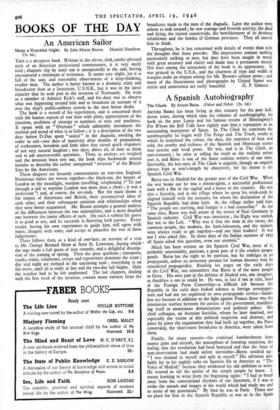BOOKS OF THE DAY
An American Sailor
THIS is a deceptive book. Written in the clever, slick, catchy-phrased style of an American professional commentator, it is very easily
read ; chapters slip by until one is unexpectedly at the end, having encountered a minimum of resistance. It seems very slight, yet it is full of the sane and reasonable observations of a deep-thinking,
erudite man. The author is better known as a dramatic critic and broadcaster than as a lieutenant, U.S.N.R., but it was in the latter car pacity that he took part in the invasion of Normandy. He went as a member of Admiral Kirk's staff, and his duty was to observe what was happening around him and to broadcast an account of it over the ship's public-address system to the men below decks.
The book is a record of his experiences, and is concerned more with the human aspects of war than with plans, appreciations of the situation, problems of strategy or numbers of men and machines. It opens with an " Overture " which admirably introduces the method and mood of what is to follow ; it is a description of the two days before D-Day spent " sealed " in the Augusta, awaiting the order to sail—two days of inactivity after months of preparation, of restlessness, boredom and little jokes that raised quick responses of not very natural laughter ; two days, above all, of time to think and to ask unanswerable questions. Then, as anchors are weighed and the invasion force sets out, the book slips backwards several months to describe the earlier unopposed " invasion " of the British Isles by the Americans.
These chapters are leisurely commentaries on war-time England. Numerous topics are woven together—the black-out, the beauty of London in the moonlight, wartime travelling, telephoning (" To put through a call in wartime London was more than a chore ; it was a profession ") and, of course, the air-raids. But the main theme is the impact of Americans and British, their preconceived ideas of each other, and their subsequent opinions and relationships when they were better acquainted. Mr. Brown attempts a general analysis of the differences between the two nationalities, and a more detailed one between the junior officers of each. On such a subject his guess is as good as any, and he succeeds in flattering both parties. Every reader, having his own experiences to guide him, will agree with many, disagree with some, and accept as plausible the rest of these judgements. There follows then, as a kind of entr'acte, an account of a visit to Mr. George Bernard Shaw at Ayot St. Lawrence, during which the sage made a full quota of neat remarks, and a delightful descrip- tion of the coming of spring. Then the pace quickens ; transports, trucks, trains, telephones, troops and typewriters dominate the scene ; day and night are merged in the unceasing rush ; everything is on the move, until all is ready at last and the two-day lull begins. Only the weather had to be left unplanned. The last chapters, dealing with the first week of the invasion, contain many extracts from the broadcasts made to the men of the Augusta. Later the author went ashore to look around ; he saw courage- and feverish activity, the dead and dying, the ruined countryside, the bewilderment of its destitute inhabitants and the hordes of German prisoners. They all caused him to think.
Throughout, he is less concerned with details of events than with the thoughts that these provoke. His impressions contain nothing particularly striking or new, but they have been caught in words with great accuracy and clarity and made into a permanent record. Not least among the attractions of the book is its appearance. It was printed in the U.S.A., and the clearness of type and width of margins make an elegant setting for Mr. Brown's urbane prose ; and many of the illustrations and photographs by United States war artists and cameramen are really beautiful. G. P. GRIGGs..






























 Previous page
Previous page